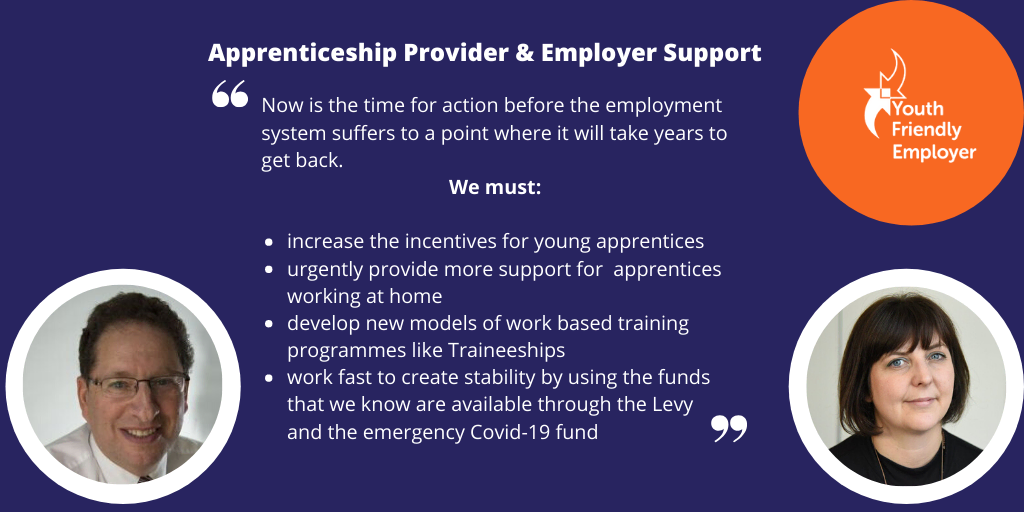There must be more support for apprentices and providers

These are very difficult and sad times. Highlighting the issues faced by a particular group can often feel exclusive and sometimes insensitive, but that is what Youth Employment UK (@YEUK2012) was set up to do.
It is critical that we step up into our role and loudly advocate for our young people. Those people who through no fault of their own may well face the scarring consequences of Covid-19 in the years to come.
Young people
In any tough employment market young people with less experience and less skills tend to suffer badly. Before this pandemic struck young people were already three times more likely to be unemployed than any other group and those with additional barriers were finding themselves even further from the labour market.
We are worried for our young people, we are already hearing the impact that this disaster is having on our young people, their education has been pulled from them, their liberty taken and their future prospects have changed in a very short time.
For hundreds of thousands young people their final year in education has been disrupted and it may well be likely that they will have even less options available to them than before.
At Youth Employment UK we are working hard with partners to change that and to ensure even more opportunities for full time education or training, or a job with training such as an apprenticeship will be possible in the months and years ahead.
We have already created a Youth Employment Covid-19 Response Group with a number of partnerships and organisations working together to try to avoid a return to the peak youth unemployment levels of 2011.
Understanding what young people want and delivering support based on that need through brilliant online content is something that makes us truly unique, we have an incredible free online resource for young people, co-created with them to support their skills and careers needs.
In the last few days our team have worked tirelessly to create additional resources for young people such as our Young Professionals Skills & Careers Booklet and some essential “surviving Covid-19” guides. We will be focusing our efforts on continuing to support young people this way.
The apprenticeship sector
We are working closely with employers, assessment organisations and training providers to try and maintain the apprenticeship programme for current apprentices and safeguard it for future generations. We need to work fast to stabilise the infrastructure for training providers and assessment organisations.
Last week we called on the government to protect apprentices and the support systems around them. That call has gone unanswered!
This Government Must: |
||
Ensure UK businesses can thrive post Covid-19
Protect those currently studying on apprenticeships
Protect those furthest from the labour market
Protect those in volatile work
Protect those still in education
Our Manifesto for Youth Employment provides further recommendations to ensure young people can thrive in work. |
The new provision put forward by Government (via the ESFA) for the Apprenticeship system does not go far enough. The rules outlined will not protect providers, training organisations, employers or young people.
Coronavirus (COVID-19): #apprenticeship programme response: #UKlockdown #Coronavirus – Guidance for #apprentices, employers, training providers and assessment organisations in response to the impact of coronavirus (COVID-19). Documents Coronavirus… https://t.co/qSSJBnhedY pic.twitter.com/AgkLKD4meW
— FE News – The #FutureofEducation News Channel (@FENews) March 23, 2020
As a sector apprenticeship providers and employers are being asked to save the apprenticeship system with not just no additional funds but with no funds at all. Providers who deliver more than 70% of apprenticeship delivery are left in the cold and we are already hearing that the system could collapse around them.
As apprenticeship programmes are disrupted providers have to adapt their programmes and support apprentices. That needs investment in both time and money.
Many apprentices will have been due an assessment at the end of their programme, this will now not happen. Under these current rules young people are at the mercy of employers being able to keep them as an employee whilst not being able to complete their programme and get the certificate to show their competency and hard-work.
Employers of all sizes are facing uncertain times and for now these conditions have no end in sight, we are at risk of a huge cohort of young people leaving the security of employment and training which is heartbreaking enough without the additional barrier of having no formal qualifications to show.
A flexible approach is needed so that providers and awarding organisations can get assessments signed off. We have seen GCSEs and A Level exams cancelled and we need a more radical approach from the DfE to make some bold decisions and get the process in place that gives the apprentices a fair assessment in difficult circumstances.
Training providers running programmes like Traineeships, Study Programmes based around work also need support as these too will get disrupted. We are already talking to our young people about how we could change the rules on how work experience is provided and looking at additional support for home learning.

Now is the time for action before the employment system suffers to a point where it will take years to get back, today and tomorrow we need to offer real alternatives to our young people.
We must:
- Increase the incentives for young apprentices
- Urgently provide more support for apprentices working at home
- Develop new models of work based training programmes like Traineeships
- Work quickly to create stability by using the funds that we know are available through the Levy and the emergency Covid-19 fund.
Laura-Jane Rawlings, CEO and Stewart Segal, Chair of Youth Employment UK












Responses